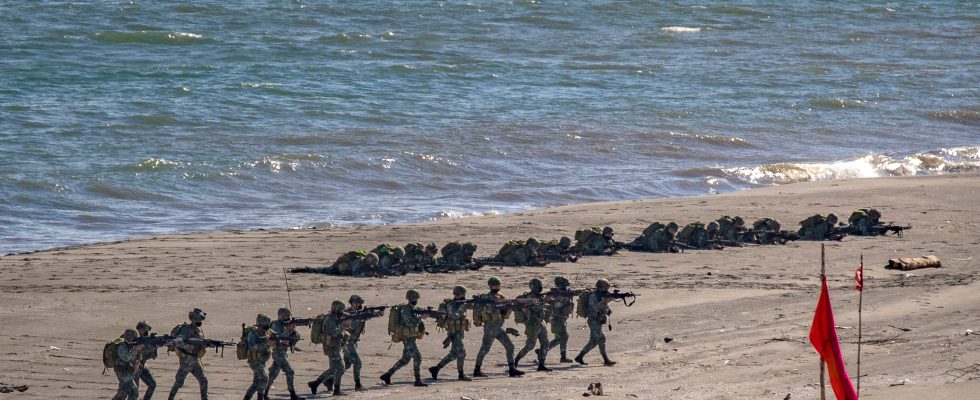An annual military exercise… the stakes of which have perhaps never been higher. This Monday, April 22, the 39th “Balikatan” (“shoulder to shoulder” in Tagalog, the official Philippine language with English) exercises begins, jointly organized by the Philippines and the United States. Traditionally limited to rehearsals for military operations on Philippine territory, the program has been largely intensified for this year 2024, the “most expensive” ever organized.
Thus, for the first time in its history, the more than 16,000 Filipino and American soldiers mobilized will notably maneuver outside the territorial waters of the Philippines, in the South China Sea. Exercises which directly respond to the threat posed by Beijing to Southeast Asia, explains the army in Manila, while the Chinese fleet is increasing its threatening maneuvers near Taiwan… but also with the Philippines.
Witness this incident last December, where a Philippine boat and a Chinese coast guard vessel collided in the waters of the Spratly Islands, claimed by China, before blaming each other. “The source of tension in our region is well known to all,” explained the Philippine Minister of Foreign Affairs, stressing that his decision to strengthen ties with Japan and the United States was a “sovereign choice” and urging China to “reflect on your own actions” in the region.
France also present
Questioned by the British newspaper The Guardian, the Filipino colonel responsible for supervising these exercises, Michael Logico, explained that the American and Philippine forces would notably simulate the recapture of islands occupied by hostile forces in the very north of the country’s archipelago, only a few hundred kilometers away. from Taiwan. But also on the island of Palawan, the westernmost island of the country, located in the South China Sea. For the first time, the Philippine Coast Guard will also be involved in the exercises. A sign that the question of borders and territorial and maritime sovereignty has perhaps never been so tense, given Beijing’s appetite in the region. “It is China’s excessive maritime claims and its aggressive behavior, including its militarization of claimed areas, which undermine regional peace and stability and increase tensions,” asserts Philippine diplomacy.
These exercises will not be just the business of Manila and Washington. Nearly 14 countries will participate as observers, including Japan, India and countries from the European Union or ASEAN (Association of Southeast Asian Nations). But France, too, will participate actively in these military maneuvers for the first time, by deploying a frigate which will sail alongside Philippine and American ships in Philippine territorial waters, in the South China Sea. A desire to continue the “construction of a form of strategic intimacy desired by the Minister of the Armed Forces during his visit to Manila in December 2023”, explains the French embassy in the Philippines in a press release.
“Tensions could worsen,” warns Beijing
The announcement of these unprecedented exercises – without great surprise – pleased the Chinese regime very little, which hastened to communicate its dissatisfaction. Chinese Foreign Ministry spokesperson Lin Jian said at a press briefing in Beijing on Wednesday that Manila “must be fully aware that when countries outside the region intervene in the South China Sea to flex their muscles and stir up confrontation, tensions could escalate and the region would become less stable.” The spokesperson also said Beijing “will continue to take necessary measures to firmly safeguard its territorial sovereignty and maritime rights and interests to maintain peace and stability in the South China Sea.”
Beijing knows it: relations between the Philippines and the United States have improved significantly in recent years, thanks to a change at the head of the country. While his sulphurous predecessor Rodrigo Duterte, president between 2016 and 2022, fully assumed his pro-Beijing positions, the new head of state Ferdinand Marcos chose to move closer to Washington. In particular, he reopened military bases closed under Duterte’s mandate, and opened four new ones. These “Balikatan” exercises are the latest proof: tensions between the United States and China are still as concrete as ever.
